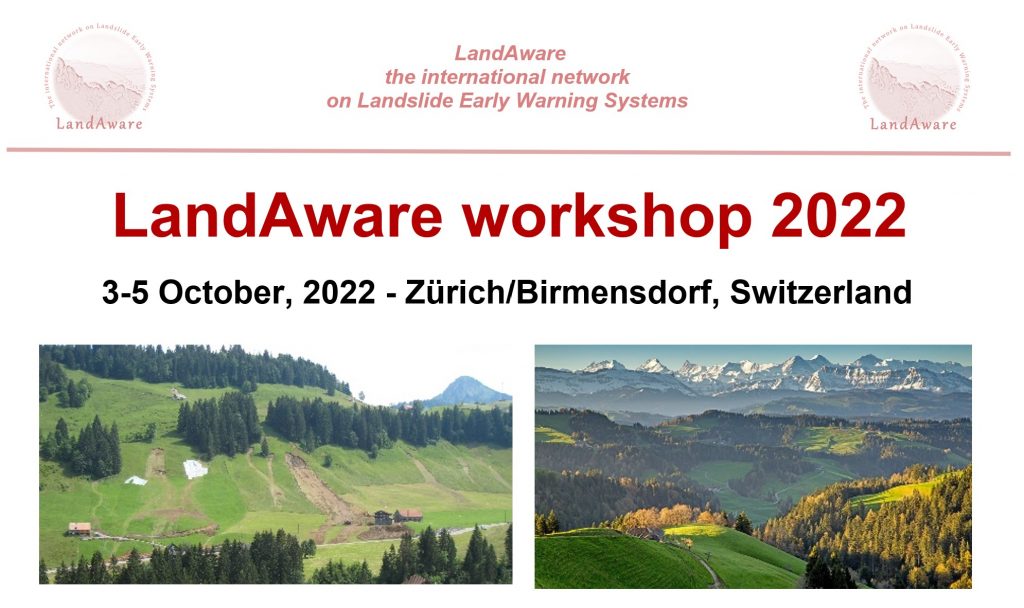NEWS received from
Mirianna Budimir (Practical Action, SHEAR)
SHEAR will be presenting a range of discussions, findings, and learning from our innovative projects at the EGU22 General Assembly- join us to hear about the advancements we’ve made towards improved landslide risk reduction and early warning since 2016. Presentations related to landslides include:
– Developing forecast information for institutional decision-makers (Monday 23 May, 17:54–18:01 Room 1.14): There remains a gap between the production of scientifically robust forecasts, and the translation of these forecasts into useful information for institutional decision-makers in early warning systems. This presentation will explore learning and share best practices about both the content and process of developing such early warning information for institutional decision-makers, providing specific case study examples and drawing on practical experience from SHEAR projects.
– Developing a methodology for the delineation of regions into landslide domains with a case study in East Sikkim, India (Tuesday 24 May, 08:52–08:59 Room 0.16): This presentation will share a new, more systematic methodology for the mapping of landslide domains, using as a case study East Sikkim district, a landslide-prone region in northeast India. Landslide domains are defined as regions with similar physical and environmental characteristics that specifically drive landslide dynamics. These domains can support the homogenous description of landslide processes, training and stakeholder engagement in landslide processes, and the development of landslide susceptibility maps and early warning.
– Value of ground information in regions with limited landslide inventory for trigger threshold development — Application in Nilgiris, Tamil Nadu State, India (Tuesday 24 May, 13:20–13:27 Room 1.61/62): Forecasting rainfall-induced landslides is increasingly important as these hazards greatly impact communities, however it is extremely challenging due to the variability of the geo-environmental factors and the scale of underlying processes. Extensive data is needed to develop end validate forecasting thresholds, but this data is often limited. This presentation will share an innovative hydrological mode, called the “BGS water balance model”, which has been used in Nilgiris (Tamil Nadu state, India) to integrate the limited data available and support the development of threshold models, enabling the mapping of conditions that lead to landslide events.
– Developing the conceptual framework for a prototype government-led regional Landslide Early Warning System in India (Wednesday 25 May, 13:25–13:32 Room M2): The LANDSLIP project has been working since 2016 to develop a prototype regional landslide forecasting and early warning system (LEWS) to help build resilience to rainfall-induced landslides in the Nilgiris and Darjeeling districts of India. In this presentation, key learning and reflections on the development of this prototype LEWS will be shared, including the challenges and outcomes of developing the underpinning conceptual framework, and the building of a shared understanding among the wide range of project partners involved.
– Serious game for landslides: a review of the literature reviews to fill an existing gap in serious game research (Wednesday 25 May, 15:50–15:56 Room 1.14): Serious games are designed to develop knowledge and skills, or to change attitudes, about a specific topic. In this presentation, a member of the SHEAR Studentship Cohort shares the findings of a review of 58 serious games related to natural hazards or disaster risk, comparing characteristics and identifying gaps to devise four ideas for serious games for landslides in data-poor regions, focusing on India.
– Road influences on landslide inventories (Thursday 26 May, 14:31–14:38 Room 1.31/32): Roads can both increase and decrease the likelihood of landslides occurring in a given region. This SHEAR Studentship Cohort presentation shares the findings of a spatial statistical analysis of landslide proximity to roads across a range of geographic settings and landslide inventory types to better understand how to use road proximity in landslide susceptibility models.
– Investigating boulder motions with smart sensors in lab experiments (Thursday 26 May, 15:39–15:46 Room K2): Events such as landslides, rockslides, debris flows, and flash floods can have destructive and possibly fatal outcomes. In these events, boulders are carried downstream under the action of gravity; the study of their movement can give important insight on the dynamics and hazards related to these processes. This presentation will share research outcomes from the BOULDER project, which has been investigating boulder motion by the use of smart sensors in geomorphology applications both in lab and field experiments in order to better understand these hazardous flows and improve early warning systems.
For full details of all SHEAR presentations and a calendar, see here.
If you have any questions, please email Mirianna Budimir (Mirianna.budimir@practicalaction.org.uk).
